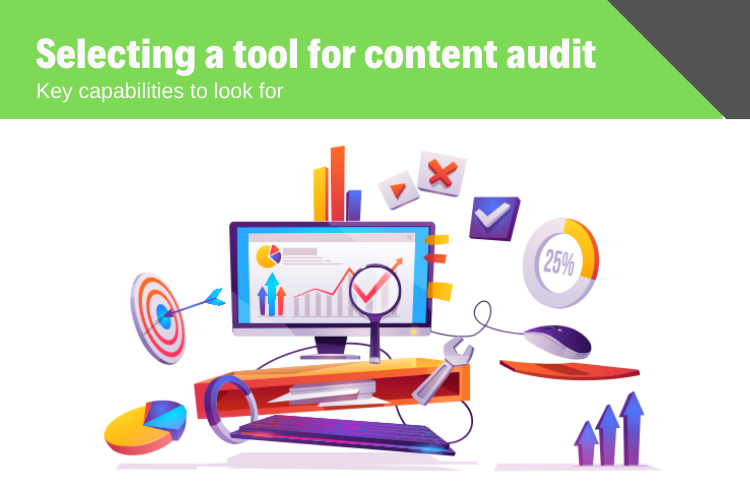
Buying tools for content marketing should not be a random act of pre-determined notions based on what others in the market are doing. Instead, Marketers must carefully evaluate their own requirements to decide which tools to onboard. In the specific context of a content audit, this requires developing a very clear understanding of the various types of content audits and the levers that they provide for you to optimize and plan your content.
Content audit-Let the why decide the what and the how
Before jumping to tool selection, start with the obvious question. What is your key objective in doing a content audit?
- Are you looking to improve organic traffic?
- Is your interest in improving content quality and content engagement?
- Maybe you are already getting enough traffic/conversions but are now looking to optimize content marketing ROI?
- Is your interest limited to auditing a single website or do you maintain a diverse content portfolio?
The reason it is important to get these answers upfront is that the market is full of players that offer tools for different types of product capabilities clubbed under one blanket of ‘content audit’. In a vast majority of cases, this audit is done on individual websites and with a very heavy bias towards identifying issues related to SEO.
Using these tools would at best enable you to identify technical SEO issues with individual pages and perhaps help improve rankings if you are able to act on the findings.
For small companies (or the ones at early stages of content marketing maturity), this may be enough but as we discussed in a previous article, content and SEO audits are two very different things.
Getting your objectives and requirements right will enable you to quickly filter through a crowded vendor landscape when it comes to selecting the right tool.
Content audit capabilities-Features to look for when selecting a tool
The table below summarizes some of the key capabilities needed for a holistic content audit.
The basic column mentions the minimum set of capabilities that you should look for in order to do a meaningful audit. Tools offering these capabilities are largely SEO audit tools with a heavy bias on identifying page-level issues that may be preventing your content from ranking higher in search engines.
The advanced column lists key capabilities for advanced Content Marketers who produce content across multiple formats and properties. These would typically only be relevant for mid/large sized Marketing departments that have the resources to do content marketing at scale. After all, being presented with a bunch of advanced audit findings is no good if you do not have the resources to act on the findings.
Marketers gearing up to build their content operations capability as the next step in their content marketing capability evolution should strongly consider tools offering these advanced capabilities.
Additionally, both capability levels have been bucketed under higher-level categories and sub-categories so as to provide a better tool evaluation framework.
Objective content scoring- Important feature of a content audit tool
The objective of a content audit is, in almost all cases, to be able to act on the findings. But what if you have a large content portfolio and would like to focus your prioritization efforts? This is where the concept of automated content scoring comes in.

With automated content scoring, Marketers can quickly get a numerical score of ‘content health’ as assessed along multiple parameters. This is hugely beneficial when planing content prioritization efforts. Without this key capability, Marketers would need to manually download and categorize audit results into CSV/Excel files in order to define the prioritization agenda.
Selecting a content audit tool-Key takeaways
Content audit tools like the one provided by Syptus offer much deeper content analysis capabilities than the ones conducting basic SEO audits in the name of a content audit. The basic premise behind the product design of content audit tools is to enable Marketers not just to attract traffic through better search engine rankings but also to do this more effectively, efficiently, and at scale.
The rationale is simple. Serious Content Marketers divert large chunks of marketing budgets aways from paid channels into content marketing. In this scenario, the purpose of a content audit is to provide much deeper insights around content and then feed this information into a rigorous, data-driven content calendar planning strategy.

